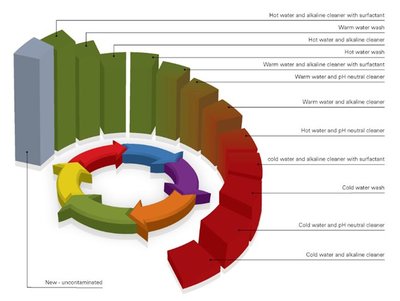Reducing bacterial biofilms on food factory floors
Tuesday, 24 September, 2013
Bacteria that persist within the food and drink manufacturing centres are those which survive and grow under the prevailing environmental conditions (temperature, product residues and moisture levels, etc) and remain viable and attached to surfaces following cleaning and disinfection. Careful consideration should be given to the selection of surface materials and the choice of cleaning regimes if you wish to minimise the presence of biofilms on surfaces within food factory environments.
Food factory floors are exposed to forklifts and machinery as well as food and liquid contaminants so the demands on the flooring performance are much higher than is required in most commercial settings.
A particular favourite within food factory companies is non-slip epoxy or polyurethane resin systems. While these systems are quick and easy to install, the material emits high levels of odours and has a low life expectancy, adding to a company’s maintenance costs and inconveniences. However, it’s the breakdown effect of resin flooring that increases the risk of bacterial growth, as dirt and grease can easily hide in cracks or grooves.
Ceramic tiles provide an alternate hygienic flooring system. Agrob Buchtal, a German manufacturer of ceramic tiles, has introduced HT tiles, a hard-wearing tile with antibacterial properties, which is claimed to provide hygienic performance for more than 25 years.
Containing a titanium coating applied during the manufacturing process, the tiles (and grout) create a photocatalytic reaction that kills bacteria, fungi and germs. What’s more, HT tiles neutralise unpleasant odours so that the room climate is permanently improved - an important aspect in food processing.
Scientific studies from the German institute Fraunhofer for Biological Process Engineering discovered that 99% of bacteria sample (eg, organic materials, pathogenic germs, bacteria, mould, etc) died within 30 minutes after contact with the HT tile surface.
Keeping your surfaces clean
To achieve perfect hygiene, careful consideration must be made with regard to the type of cleaning process and cleaning agents. HT tiled surfaces are hydrophilic, causing water to spread over the flooring surface as a thin film that infiltrates dirt and makes cleaning easier.

In order to avoid destruction of the flooring surface and underlying materials, it is necessary to have a good knowledge of the materials to be cleaned, the nature of the contamination to be removed and the chemical characteristics of the cleaning agent. Some cleaners are highly toxic and can strip the surface of your floor (whether its tiles or epoxy), damaging its longevity.
Cold water washes in conjunction with cleaning agents will lead to a reduction in safety. The chart shows that cold water wash will not remove floor contamination, such as oils or fats, resulting in a reduction of slip resistance to create unsafe flooring; and an increased risk of harbouring bacteria.
Australian bushfood could extend shelf life of meat
Kakadu plum is showing promise as a chemical-free alternative for meat preservation due to its...
Specialised compressed air for the food industry
Compressed air is a key utility supporting the food packaging and food processing industries in...
Mars steams ahead with renewable technology for pet food process
Mars Petcare's home-grown sustainability venture Green Steam allows its Wodonga factory to...












